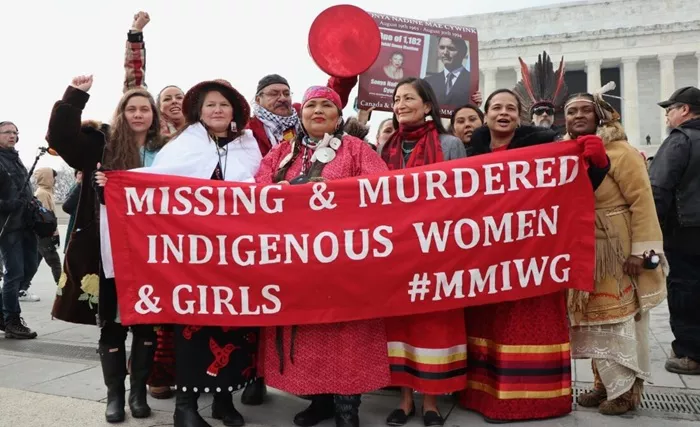Acclaimed crime novelist Marcie Rendon visited the Muir Library in southern Minnesota last week to discuss her latest novel, Where They Last Saw Her, a work of fiction that confronts the real-life crisis of Missing and Murdered Indigenous Women and Relatives (MMIW/R).
Rendon, a member of the White Earth Nation of Ojibwe in northern Minnesota, spoke to a small audience of approximately 15 to 20 community members, mostly white women from the local conservative, agricultural region. Her appearance was part of an effort to raise awareness about the persistent violence facing Native women, often overlooked in national conversations.
The novel’s protagonist, Quill, a Native American woman and mother, hears a scream while jogging on her reservation—an event that propels her into an unfolding investigation. While the book is a fictional thriller, Rendon said it draws heavily on the harsh realities experienced by Native women across North America.
“I’m a crime junkie,” Rendon told the audience. “I love to create page-turners. But I also wanted the story to reflect real issues.”
Throughout the discussion, Rendon made connections between the plot and the broader movement to raise awareness of the thousands of Indigenous women who go missing or are murdered each year—often with little media coverage or law enforcement response.
A passage from her book features Quill’s husband, Crow, voicing concerns familiar to many Native families:
“Those same men are here now. I don’t want anyone from my family to go missing. To end up dead in a ditch or a river. No. Not on my watch.”
Audience members largely focused their questions not on the novel’s literary elements but on the real-world crisis it addresses. Rendon said that public awareness of the MMIW/R issue remains limited, particularly outside Native communities.
“When I go out East to talk, most people think we’re all dead,” she said. “They think we disappeared with the Black Hills gold rush. And if people don’t think we exist, it becomes easier for us to disappear.”
May 5 marks the National Day of Awareness for MMIW/R, a date that has helped bring more attention to the issue. Still, Rendon noted that gaps remain, recalling a conversation in Madison with a college professor who was unfamiliar with the movement.
Rendon’s novel is one of several fictional works used to illuminate Indigenous issues. In 2018, for instance, Wisconsin Reads promoted The Round House by Louise Erdrich, a novel that similarly tackled jurisdictional complexities and gender-based violence on reservations.
Rendon is also known for her Cash Blackbear series, which follows a young Native woman solving crimes in the 1970s Red River Valley. The idea for Where They Last Saw Her emerged during a conversation with her editor, who asked what major issue currently affects Native communities.
“I said, ‘missing and murdered Indian women,’” Rendon recalled. Initially hesitant to write about such a painful topic, she said, “There’s no happy ending. They’re either dead or they’re still missing.”
The book is set on a fictional reservation near Duluth, mirroring real concerns raised during the construction of Enbridge’s Line 3 pipeline through the Fond du Lac Reservation, completed in 2021. Native leaders warned that so-called “man camps”—temporary worker housing for male laborers—could increase risks of violence and trafficking.
Those fears were substantiated in a 2021 Guardian article reporting over 40 incidents of harassment or assault by pipeline workers in northwestern Minnesota. Concerns have also surfaced in Wisconsin, where Enbridge plans to reroute Line 5 outside the Bad River Reservation. Members of the Bad River Band and the Wisconsin MMIW/R Task Force have voiced opposition, citing both environmental and public safety threats.
Rendon draws a direct link between extractive industries and the MMIW/R crisis.
“Anytime you have an extractive industry—pipelines, gold mines, uranium mines—you bring in large groups of men without their families or oversight,” she said. “It’s just like the Wild West.”
Some companies, she added, have begun placing workers in hotels with their families to address safety concerns. “Talk about the power of women,” she joked. “Bring your wife and she’ll make you go to church.”
Community, especially among Native women, plays a central role in Rendon’s novel. Her protagonist, Quill, is rarely alone. She is accompanied by two friends—Punk and Gaylyn—who support her efforts to search for missing women.
“In Native communities, you almost never do anything alone,” Rendon said. “If I’m going to the grocery store, someone’s with me. There’s a sense of togetherness.”
She credited First Nations women in Canada with launching the grassroots movement that brought MMIW/R to public attention. “It started with women gathering and speaking out about what was happening near man camps.”
Rendon has also addressed internal challenges within Native communities, including domestic abuse. In her book, one of the male characters is abusive, a portrayal that drew some criticism.
“We have bad people in our communities, too,” she said. “Domestic abuse happens everywhere. In smaller communities, people know it’s happening, but they don’t talk about it.”
In 2024, Minnesota reported 716 missing Indigenous individuals—57% of them women—according to the Bureau of Criminal Apprehension. Wisconsin lacks a centralized system to track such data, a gap that advocacy groups are pushing to close.
Rendon praised Minnesota’s establishment of an MMIW/R office that tracks cases, supports families, and offers rewards for information. In Minneapolis, she said, the American Indian Movement’s Indigenous Protectors group plays an active role in search efforts.
Researching the novel also exposed Rendon to differences in how missing women are perceived. She noted that white women were sometimes blamed for their own disappearances due to personal behavior, whereas Native communities were more likely to reject that narrative.
“The Native community says, ‘I don’t care what our women were doing—nobody deserves to be trafficked or to end up dead in a ditch,’” she said. “That cultural difference surprised me.”
Where They Last Saw Her is now available nationwide.

